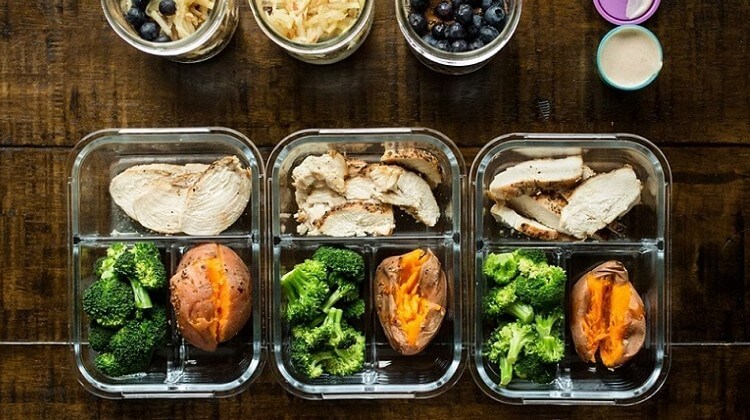If you are new to the world of fitness and bodybuilding, you may be wondering what to do to build lean muscle mass and shed excess body fat.
You might even have a vague idea of what to do, you might be set on inculcating a strength training program with a structured dietary plan.
If this is what you plan to do, then you are on the right track. But have you given some thought to tracking your food intake, how to go about it and the benefits of such practice to your expected results?
In this article, we start by highlighting some tried and trusted methods for tracking food intake during a training program.
You will also find the key benefits of tracking your food intake in this post, and we close with useful tips for effective and efficient food tracking.
Reliable Methods of Tracking your Food Intake
It is an understatement to say that the foods you consume play a major role in your physical development.
The macronutrients you consume each day provides your body with the nourishment needed and as an active bodybuilder, a calorie surplus would go a long way in meeting your daily energy requirements for your strength training regime.
But how do you know if you are maintaining a calorie surplus or deficit?
How do you know what foods to eat and when to consume them?
What foods should you avoid?
These and many more questions typically run through the minds of the average bodybuilder and more so as a beginner.
It therefore goes without saying that you are what you eat and if you consume more junk food than clean food, then you can expect to suffer the consequences of unhealthy eating habits.
Likewise, if your meals consist mainly of a clean diet, then you should expect to reap the benefits of sticking with a natural, healthy dietary plan.
One way to avoid falling back into bad eating habits, is to keep a keen eye on what you consume on a day-to-day basis.
This is where the art and science of food tracking becomes a necessity and not an option, especially where you are determined to achieve specific bodybuilding goals.
But do you know how to track your daily food intake?
There are many tried and tested food tracking methodologies that you could adopt and here are a few available to you today.
#1. Keep a Daily Journal Entry
This is arguably the most popular and less complicated way of tracking your food intake.
You can always fall back on the entry in your journal if you need to remember the quantity and quality of your foods.
Keeping a daily journal entry will keep you abreast with whether or not you are adhering to a maintenance, deficit or surplus diet.
#2. Make Use of Food Tracking Apps
If you are someone that prefers typing rather than writing, then a food tracking app may prove to be extremely useful.
For starters, it saves you the headache of scribbling down data, and scrolling through your journal entry for information.
Using a food intake tracking app is more convenient and many apps offer notifications and reminders to keep you on top of your meals with good timing, calorie counting (macro calculator) and expected result/outcome predictors. These and many more features are readily available in most food tracking apps.

#3. Maintaining a Mental Log of your Food Intake
This is perhaps the most mentally tasking and draining method of tracking your food intake. You would need to be of sound mind to be able to keep a mental log of your daily meals and their respective calorie count.
It is not unusual for people using this type of food tracking method to forget stuff which is why maintaining a mental.log is not the most popular and it isn’t highly recommended by most personal trainers and bodybuilding coaches.
The Key Benefits of Tracking your Food Intake
Everyone has a reason for tracking their food intake. Whether you are working on a bulking or cutting program, it is vital that you monitor what you consume each day using any one of the three food intake tracking methods highlighted.
So without further ado, some of the key benefits of tracking your food intake on a daily basis are:
#1. A Greater Understanding of your Eating Habits
By tracking your food intake, you will have a greater understanding and appreciation of your daily food intake. You will know whether or not your daily meals consist of a higher percentage of junk food compared to clean, natural foods. You will also know what foods and meals you consume more often compared to others.
Your understanding of your consumption habits will also extend to your awareness of the number of calories you consume daily.
You will know whether or not you are keeping a surplus, deficit or maintenance daily calorie count and this will enable you to adjust your daily caloric intake accordingly in order to attain your diet and nutrition goals.
#2. Better Food Intake Accountability
Whenever you decide to track your daily meals via a mental note, journal entry or food tracking app, you end up being a more responsible person.
You end up taking charge of your life and deciding on what you should eat and what you should avoid.
This discipline, commitment and sense of purpose will serve you well when you work towards achieving your specific bodybuilding goals through training and dieting.
#3. Assured Precision in Calorie Counting
Using a food tracking app and macro calculator will ensure that you keep precise records of your daily calorie count.
A typical food tracking app will provide accurate calorie counting for all your meals including pre-workout and post-workout snacks.
When it comes to calorie counting, precision could be the difference between adding and losing weight.
Therefore, you should always endeavor to input every food consumed during your day in order to have better clarity as to the total calorie count in comparison to your expected daily calorie requirements.

Tips for Efficiently Tracking your Food Intake
You can adhere to these tips to efficiently track your daily food intake.
#1. Be Consistent
There is no point in inconsistency if you want to track your food intake. You should make sure to keep your journal entry current or input daily data in your respective food tracking app. Inconsistency in food tracking could have dire consequences for your bodybuilding efforts.
#2. Always Seek Convenient Food Tracking Options
Using a food tracking app is the most convenient option that you really should stick with when tracking your daily food intake.
Today’s food tracking apps offer several useful personalized features. These features will not only take care of your food intake entry and calorie count, but will also provide you with accurate calculations for other important metrics like your current Basal Metabolic Rate (BMR), Body Mass Index (BMI), Bone Mass, Water (Retention) Muscle Mass and so on.
#3. Be Accurate in your Data Entry
Whether you are writing down stuff in your journal or typing an entry in your preferred food tracking app, you should always endeavor to give detailed, accurate data.
Do not speculate, but rather provide only specifics based on facts. For example, while making a handwritten journal entry or inputting data in your food tracking app, if you ate two slices of wheat bread for breakfast, you should indicate the exact number of slices of wheat bread you consumed rather than just stating that you ate wheat bread for breakfast. This way, you will be able to accurately keep track of your daily calorie count.
#4. Preparation is Everything
It is important that you prepare for your day well ahead of time. You should have a clear idea of the meals you intend to consume (the next day) a day beforehand.
This way, you will be able to stay on track with your dietary plan towards achieving your set bodybuilding goals.
By having a detailed idea of your entire meal plan for the following day, you will know the calorie count compared to the previous day which enables you to decide on whether to run a calorie surplus or deficit as the case may be.

Conclusion
As you can see, the importance of food tracking to your bodybuilding program cannot be overemphasized.
You need to have a clear idea of what you consume on a daily basis while also keeping track of your calorie count to ensure that you are eating according to your expected daily requirements.
You should try out a journal entry or preferably a food tracking app instead of keeping a mental log, as the latter is more susceptible to oversights and mistakes.
If you want more information on how tracking your food intake can be of benefit to your bodybuilding program, you can reach out to an IFBB PRO at Anabolic Coach for free today.


